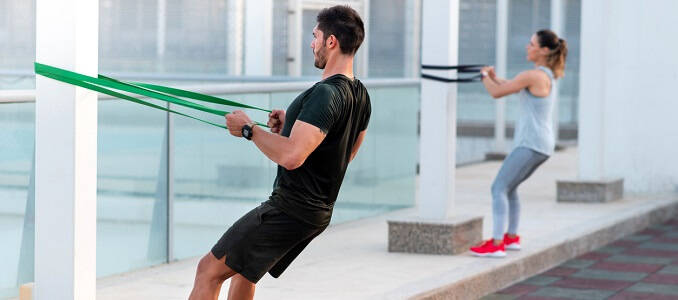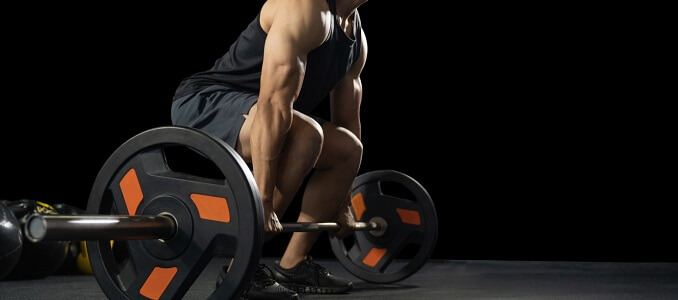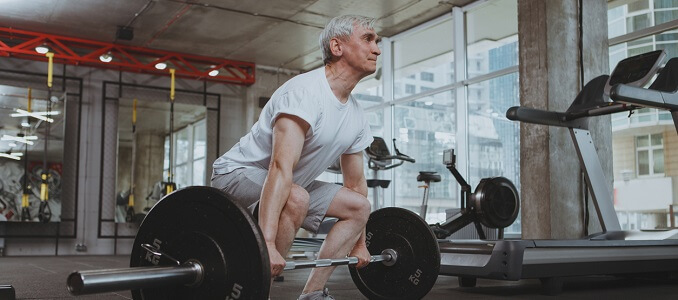Are There Exercises That Can Increase Testosterone?
Exercise can increase your testosterone level. However, some exercises are better than others to boost testosterone.
Personal trainers and doctors agree that strength training and resistance training, such as weightlifting, are the best types of exercises to boost testosterone levels.
Low testosterone can impact a man’s emotional and physical health. Exercise alone cannot treat men with severely low testosterone levels, but for men who may feel moderate symptoms of low testosterone, exercise may help.
There is a definite link between exercise and testosterone levels.
Strength Training and Increasing Testosterone
Resistance training and strength training exercises are the best to raise testosterone. High-intensity interval training (HIIT), in particular, has been found to boost testosterone levels. HIIT consists of repeated sessions of high-intensity cardio, followed by various less intense recovery times. This type of training can be accomplished using bodyweight, resistance bands, free weights, medicine balls, or weight machines. Studies have found that short HIIT sessions can do more to raise testosterone than much longer periods of less intense exercise. For example, one study found that doing only 90 seconds of intense treadmill running interspersed with 90-second recovery periods boosted testosterone levels more significantly than simply running or jogging at a moderate pace for 45 minutes.
What Are the Best Exercises to Increase Testosterone?
In addition to HIIT, some of the other best exercises for increasing your testosterone level are:
Resistance Training – Resistance training, often referred to as “weight training” as opposed to “weightlifting” — involves making your muscles work against a weight force. Resistance training usually involves machines and resistance bands that use your own body weight. TRX suspension training, used by the US Military, is a form of resistance training particularly good at boosting testosterone.
Bodyweight Exercises – You can boost your testosterone with “bodyweight exercises” that require no equipment at all. By performing bodyweight squats, push-ups, pull-ups, and sit-ups, you can exercise a range of muscles across your body, growing strength, and boosting testosterone. And, the best part is you can start right away, at home, without having to join a gym or purchase any special gear.
Lifting Weights – Next to HIIT, most personal trainers say that lifting weights is one of the best exercises for raising your testosterone level.
Weightlifting and Testosterone
Lifting weights has been found to have a more significant impact on raising your testosterone levels than most other strength-training workouts. Within your weightlifting regimen, the exercises that maximize testosterone production are multi-joint exercises that utilize the body’s largest muscle groups:
- squat
- deadlift
- bench press
- row
- overhead press
The research on testosterone and weightlifting also suggests that you can enhance the testosterone boosting impact of lifting weights by:
- Using more muscles groups – For instance, a full-body workout positively affects testosterone than doing a weightlifting exercise that only focuses on a single muscle, such as biceps curls.
- Lift heavier weights rather than doing many reps of lighter weights.
- Have shorter rest periods during your workout.
Certain exercises are better than others at boosting testosterone. Weightlifting and HIIT are the best.
What Does the Research Say About Exercise and Testosterone?
There have been many clinical studies that provide evidence for the link between exercise and boosting testosterone.
- A 1983 study looking at the testosterone levels in men and women after lifting weights found that men experience significant increases of testosterone while women experience almost little or no increase.
- A 2001 study of women found that resistance training can temporarily increase testosterone and have an impact on fat distribution.
- A 2004 study of older men found that regular physical activity increased testosterone and also had a positive effect on cognitive function.
- A 2007 study found that men who did resistance training 3 days a week for 4 weeks increased their testosterone levels immediately after a workout that subsisted over time.
- 2014 study found that HIIT increased testosterone levels in men.
- Earlier studies confirmed that repetitive weightlifting had a positive impact on testosterone levels in older men.
How Does Exercise Affect Your Testosterone Levels?
Exercise boosts your testosterone levels mainly in two ways: building lean muscle and reducing fat. The exercises mentioned in particular help you to build lean muscle. More lean muscle increases your production of testosterone. By increasing your muscle tone, testosterone also boosts your metabolism and increases your ability to burn fat. This leads to weight loss and a reduced risk of obesity. Obesity is known to reduce your testosterone level.
What Is the Best Exercise for Older Men to Increase Testosterone?
The best exercises to increase testosterone in men over 50 are all of those mentioned so far. Strength training and resistance training remain the cornerstone of any testosterone boosting exercise routine. Doing a full-body workout two to three times a week can also be an effective way to raise testosterone by maintaining muscle mass. When building a routine, fitness professionals say to be sure to include exercises for all of the major muscle groups, including legs, glutes, chest, back, shoulders, arms, and core muscles.
Given the physical limitations that can occur as men age, older men should check with their doctors or a fitness professional before starting on an exercise regimen designed to boost testosterone.
Are There Other Ways to Naturally Increase Testosterone?
Besides the exercises listed above, there are several other ways to naturally give your testosterone level a boost.
- Reduce stress levels – Increased stress leads to increased cortisol levels in your blood. When your cortisol levels go up, your testosterone levels go down. So, taking measures to reduce stress can increase your testosterone.
- Eat a healthy diet high in protein, fat, and carbs.
- Reduce your consumption of processed sugars and junk food.
- Reduce your consumption of alcohol.
- If you smoke, quit. If you do not smoke, don’t start.
- Take vitamin supplements, including vitamin B, vitamin D, and zinc.
If you do the workouts and make the lifestyle changes we have mentioned and still feel you may be feeling the symptoms of low testosterone, you may need to have your levels checked to see if you are a candidate for testosterone replacement therapy.
Lifestyle changes and exercise alone may not be enough to help older men experiencing age-related testosterone decline.
Now that you know a little bit more about the relationship between exercise and testosterone levels, why not contact us today and learn more about the many life-changing benefits of increasing your testosterone.
- Men’s Journal
- cazybulk
- Men’s Health
- T Nation
- Which Exercise Is Better for Increasing Serum Testosterone Levels in Patients with Erectile Dysfunction? Jeong Kyun Yeo, Seung Ik Cho, Sun Gu Park, Seok Jo, Jeong Ku Ha, Jeong Woo Lee, Sung Yong Cho, and Min Gu Parkcorresponding author World J Mens Health. 2018 May; 36(2): 147–152.
- Bodybuilding.com
- Cortes
- FitFatherProject
- Dr. Tracy Garpin
- EVERYDAY HEALTH
- Muscle& Fitness
- Muscle&Performance







